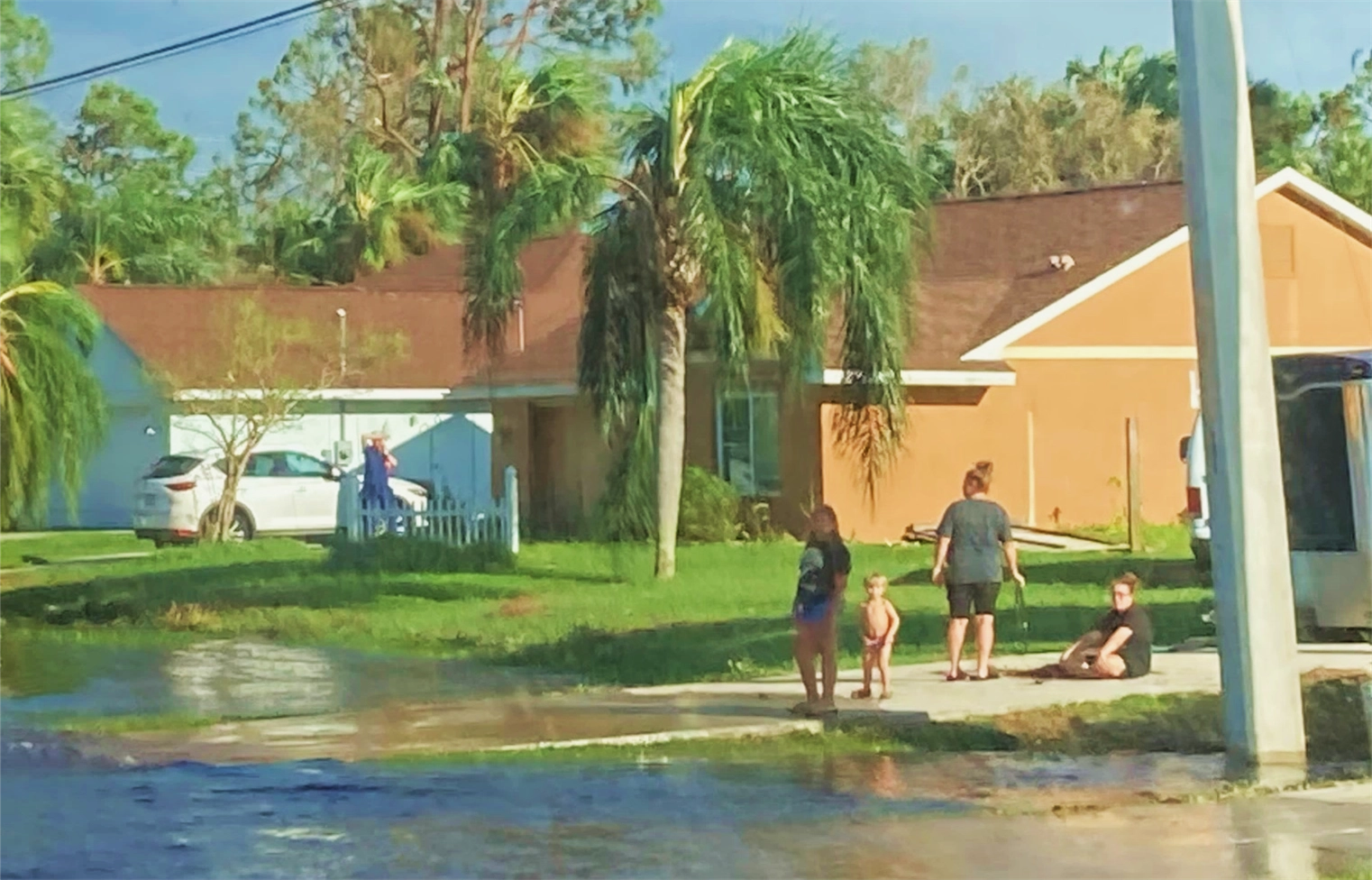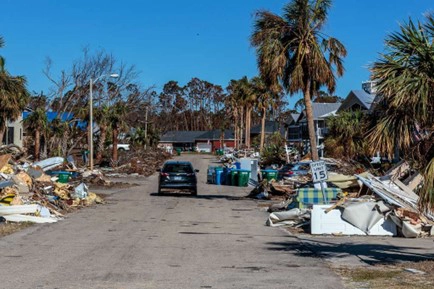
October saw a string of dangerous and deadly storms in Florida. Those who made it through the storms are now cleaning up, in the midst of severe property damage along the Gulf Coast.
With Hurricane Milton quickly following Hurricane Helene, Florida homeowners’ insurance adjusters had their hands full. No wonder insurance payouts to Floridians in 2024 are now running at more than $100 billion, as reported by analysts at the Fitch Ratings firm.
In fact, this is the fifth year in a row that homeowners’ insurance losses in Florida have topped $100 billion. And Fitch says there’s still more to come. The continuing need for renovation materials will add 20% or more. Fitch calls Florida’s insurance situation “precarious.”
Foreclosure by Hurricane? Look Out for Cat 3

A new study has delved into climate-related hazards and their effect on deed holders with mortgages. The study focused on Florida, where storm and flood data are abundant. The study reviewed more than 69,000 mortgages.
The results of the study shine a spotlight on the tie between high-category tropical storms and the nonpayment of mortgage debts. Default incidents go up notably with higher hurricane category numbers. The jump from a Category 2 storm to a Category 3 brings with it much more damage — and a notable difference in defaults.
In areas with repetitive flooding, the higher the rainfall totals, the higher the risks of mortgage defaults. Flooding, like hurricane damage, correlates to higher rates of mortgage defaults — the worse the damage, the higher risk of credit troubles for the deed holder.
Another interesting point this study highlighted? Deed holders act to keep their mortgages in good standing. Those who expect their units to flood are less likely than other borrowers to try to pay their mortgages off faster. Borrowers in flood-prone areas tend to hold onto extra funds — in case they need to pay for any flood damage that their homeowners’ insurance companies won’t cover.
Important note for Florida deed holders: Starting this month, home sellers in Florida must disclose past flood insurance claims.
Working With FEMA: How to Apply for Disaster Assistance
Floridians and others who experience disasters may need help to restore a damaged home and replace damaged property. The Federal Emergency Management Agency accepts applications for repair and replacement assistance funds.
The government knows documents can be lost or destroyed in severe flooding or storm events. So, “to address historic challenges faced by disaster survivors,” FEMA has simplified its application process. For disasters declared any time from March 22, 2024 on, you’ll just need to show:
- You own or rent the affected home. FEMA now accepts more types of proof. To prove you owned your home when the storm struck, you can submit a copy of your home’s deed, but there are a number of other accepted documents, such as mortgages or insurance policies, heirship documentation, or property tax receipts. These are just a few examples of acceptable proof.
- You were living in the home as a primary residence. FEMA accepts a number of pieces of proof that you were living in the affected home when disaster struck. You only need one. Documentation can consist of household bills; account statements; a state ID, driver’s license or vehicle registration; a voter registration card; or other listed forms of personal ID.
If you can get to a computer, upload the documentation to the FEMA website. If you need help submitting your proof, call FEMA’s helpline: 800-621-3362.
Caution! After storm surges come the surges in rip-offs. Be on the lookout for scams after disasters.
Power to the Buyers: Zillow Puts First Street’s Climate Risk Data on Home Listings
Today, four out of five home buyers look at climate-related hazards before they acquire their deeds.
They’re wise to do so.
Recently, Zillow® researchers found that more and more homes coming into the real estate market have significant climate vulnerabilities.
For all homes placed on the market in August 2024:
- About 17% carry a serious wildfire risk.
- About 13% are subject to high flood risks.
This type of risk data is now in demand. The real estate industry is starting to respond. Listings of U.S. homes for sale on the Zillow website will soon show risk data related to flooding, wildfires, wind, heat, and air quality. The Zillow website is the most frequently visited U.S. real estate site.
The climate risk assessments are produced by the climate risk analysis firm First Street™. The firm says visitors to Zillow’s website will get the benefit of the same property-specific data “used by top banks, agencies and investors.”
Zillow is also including wildfire, wind, and flood insurance recommendations for individual listings. Zillow will also make interactive maps available, so risks of one home can be compared to surrounding properties. The information offered is based in part on past flooding, wildfires or other events in the area and at specific addresses.
People looking at homes will have access to data on key risk factors, rather than simply guessing. Here’s an illustration, provided by First Street, of how helpful this access can be:
- A First Street review of the flood damage caused by Hurricane Debby showed that four out of five damaged properties existed outside the boundaries of FEMA’s flood zone maps. So, many of the affected deed holders lived without flood insurance.
- Zillow’s new risk factor tool would find that risk on 85% of the properties that flooded, and would recommend flood insurance to the home shopper.
So, the Zillow website tool should be able to help buyers more effectively plan for the future and avoid costly mistakes in some cases. Expect to find Zillow’s tool up and running in late 2024.
What Now? Preparing for New and Growing Risks
As people deal with massive insurance costs in Florida, many would-be buyers want to know how to avoid similar situations. So, it’s good to see Zillow and First Street delivering actionable data to those who want to acquire home deeds. Especially as First Street projects a steady rise in climate-related mortgage risks in the years ahead.
Climate risk data will be important for insurers, lenders, real estate agents, and buyers.
The stronger a buyer’s grasp of risks, the better the buyer can be at planning a financial future, and protecting the value in a deed.
Supporting References
Matt Tracy for Reuters, part of Thomson Reuters: Fitch Says Hurricane Milton Will Push 2024 Insured Losses Over $100 Billion (Oct. 10, 2024; new discussing insurance claim calculations published by the financial analysis firm Fitch Ratings).
Bill Madden for the activist360 project: Navigating the Storm – How Climate Change Influences Mortgage Defaults in Florida (Jan. 21, 2024).
Fact Sheet from the Federal Emergency Management Agency via FEMA.gov: How to Document Home Ownership and Occupancy for FEMA Disaster Assistance (Oct. 2, 2024).
Risk Factor, from First Street Technology, Inc. via FirstStreet.org: Zillow Introduces First Street’s Comprehensive Climate Risk Data on For Sale Listings Across the US (Sep. 26, 2024).
And as linked.
See more on: How an emergency impacts your title, Climate risks and insurance
Photo credits: PCHS-NJROTC, licensed under CC BY-SA 4.0 International; and Steve Zumwalt for FEMA, via the Public Domain Archive.
